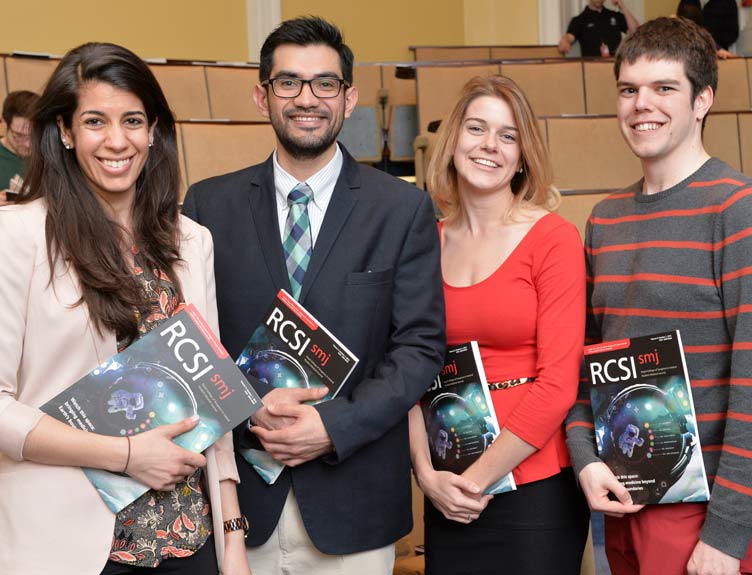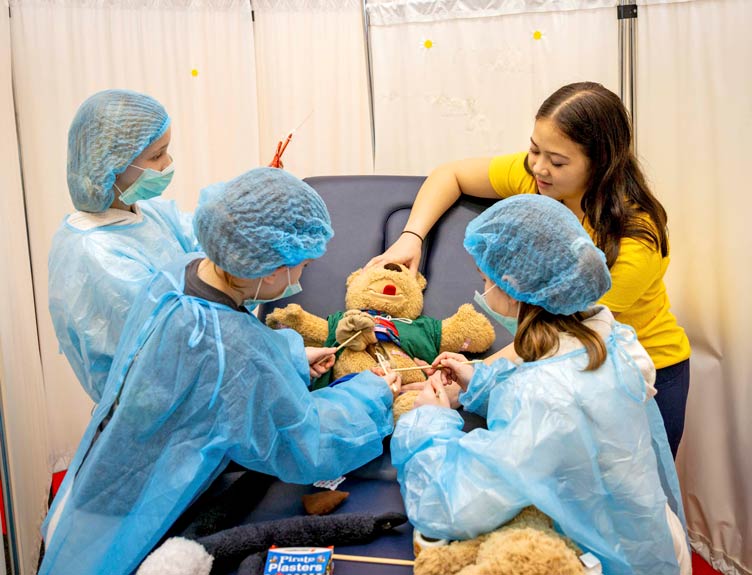Student journal investigates medicine in space and genome sequencing

Students from RCSI (Royal College of Surgeons in Ireland) have launched the ninth edition of the RCSI Student Medical Journal (RCSIsmj).
RCSIsmj is produced entirely by students for students and staff of the College. The journal aims to promote student authorship and to foster research, innovation and student participation in healthcare issues. The 2016 publication was led by a team of students headed by Mohit Butaney, Editor-in-Chief, and Natalie Achamallah, Director of the RCSIsmj. The online version of the journal is available to view and download from the on the RCSIsmj website.
RCSIsmj is a multidisciplinary publication which includes articles and submissions from medical, physiotherapy, and pharmacy students. The articles range from original research, audits, and special interest pieces to the publication of abstracts, case reports, and elective reviews.
Article topics in this year's edition include genome sequencing, a history of fibromyalgia (a syndrome characterised by fatigue and chronic pain in the muscles and in tissues surrounding the joints), an exploration of explore the views of Irish healthcare professionals on barriers to increasing smoking cessation advice for patients and an epidemiological evaluation of rotavirus virus in Uganda and potential impact of a vaccination.
Reviews on the role of glucose monitoring in paediatric type 1 diabetes, antibiotics, the role of the gut-brain axis on appetite control and the future of medicine in space are also published in the RCSIsmj. The journal also features case reports on topics such as a rare case of post-gastric bypass hypoglycaemia and an unusual presentation of Castleman's disease (which is a rare disease of lymph nodes and related tissues).
To mark the launch of the RCSIsmj, a debate was held on Friday, 22 April in the Albert Lecture Theatre which was chaired by Dr Siobhan O'Sullivan, Chief Bioethics Officer for the Department of Health. The motion, ‘This House believes that gene editing should be banned permanently' was debated by Dr Brendan Doyle, Consultant Pathologist, Beaumont Hospital and Dr Sudipto Das, Postdoctoral Fellow in RCSI's Department of Molecular and Cellular Therapeutics.
This year the Ethics Challenge competition will focus on gene editing and whether or not a temporary or permanent global ban on human germline editing should be introduced. Students will also be asked to investigate if there is an ethical difference between using gene editing for the avoidance of severe inherited diseases or for enhancement of human capabilities. The debate provided a starting point for students to consider the issue, and write a submission for next year's journal.
The RCSIsmj launch event concluded with the presentation of the 2015/16 Ethics Challenge prize to medical student Deirdre Harford for her essay ‘The use of untested drugs in the treatment of the Ebola virus' which explores the ethical issues in relation to the provision of untested drugs in treating Ebola during an outbreak of the virus with regard to clinical trials, intervention availability and duty of care beliefs. Deirdre's winning essay features in the current edition of RCSIsmj.
Speaking on the 2016 edition, Professor Hannah McGee, Dean of the Faculty of Medicine and Health Sciences, RCSI said "As with every high quality journal, the continued success of the RCSIsmj is truly the result of the dedication, teamwork and graft of our student editorial team who collaborate and are supported by our academic staff. Our students, who are in the early stages of their careers, can use this forum to present their research skills and interests as well as giving them a better understanding of how research can be translated to treating real-life patients, which in turn leads to better clinical care and best practice patient care.
"The RCSIsmj is a fantastic publication and at the College we present copies of this to many visitors from other educational institutions or prospective students. There is no better way of giving people a flavour of the pedigree of our students than getting them to read the high quality of research that is present in the journal."
The RCSIsmj provides a medium for RCSI student contributions to the field of medicine, in any discipline. The journal publishes student research ranging from basic laboratory science and clinical work to humanities analyses of medicine in society. The goal of the RCSIsmj is to encourage student research, writing and submission for publication, whilst reaching a broad international readership through both our print and electronic versions of the journal.



